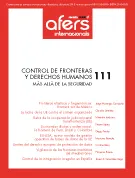Illicit economies and social order: the border area of Peru, Brazil and Colombia

In recent years, the border shared by Peru, Colombia and Brazil has become an enclave of drug production and trafficking for the international markets. It is a territory whose control is disputed by non-state actors and where state security forces suffer from severe material and transport limitations. This paper takes an ethnographic approach to explain the limitations of border security and the institutional challenges of controlling drug and wood trafficking in this context. It places the ideas of reproduction and social change at the centre of the discussion on drugs and borders, as key ways of thinking about the dynamics of growing and processing coca-derived drugs in the global South.
Key words: Brazil-Colombia-Peru border, social control, development, border security, drug trafficking, social reproduction
>> The full text articles of this issue are available only in Spanish language